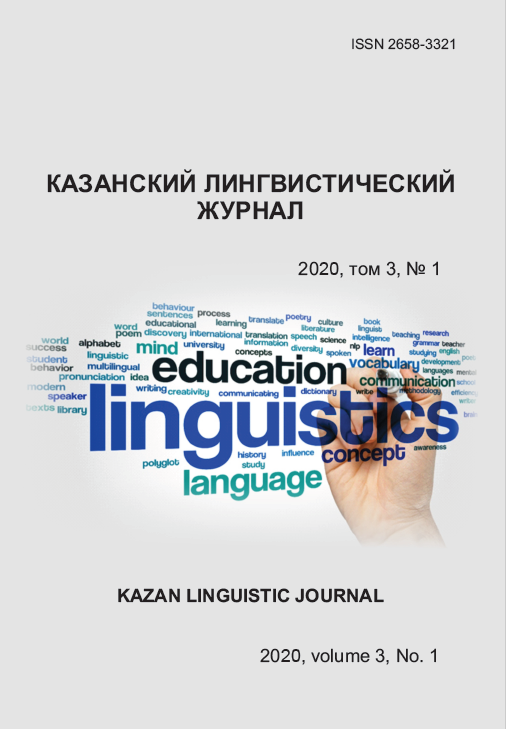Military vocabulary as a special element of lexical system of the language
Keywords:
военная лексика, военная терминология, военная терминосистема, военный термин, военная терминосфераAbstract
This article is dedicated to one of the most pressing topics in the modern world – military vocabulary, often used in the media, thanks to the rapid scientific and technological progress, advanced weapons technologies, as well as frequent military conflicts. In connection with the definition of the concept “military terminological system”, the issue of defining the key concept “terminological system” is discussed, one of the main conditions for the existence of which is the systematic nature of the elements. The author also considers the conditions that ensure the consistency of terminology, the conditions for the formation of terminological systems, as well as its main features.The article analyses the existing definitions of the concept “military vocabulary”, concludes that it is precisely the terminological units that form the basis of military vocabulary, and various classifications of military vocabulary based on identifying certain significant aspects of the military branch are considered. In addition, the article highlights such concepts as “military terminology”, “military terms system”, “military term” and “military terms sphere”. Besides to the definitions of the concepts under consideration, the author focuses on the characteristics of these terms, as well as on their distinctive features. The article concludes that military vocabulary can be considered political markers of the present time.
References
Литература
Алексеева Л.М., Василенко Д.В. Системность терминологии [Электронный ресурс] // Вестник Пермского университета. Российская и зарубежная филология. 2015. № 4 (32). // URL: https://cyberleninka.ru/article/n/sistemnost-terminologii (дата обращения: 30.01.2019).
Военная энциклопедия [Текст]: в 8 т. / М-во обороны Российской Федерации, Ин-т военной истории; гл. ред. комис.: С.Б. Иванов – пред. [и др.]. – Москва: Воениздат, 2004. Т. 8. 579 с.
Гринев С.В. Введение в терминоведение/ С.В. Гринев. М.: Московский лицей, 1993. 309 с.
Глушко М.М. Функциональный стиль общественного языка и методы его исследования / М.М. Глушко. М., 1974. 160 с.
Исаева Е.Д. Особенности японской военной терминологии / Е.Д. Исаева
// Вестник Иркутского государственного лингвистического университета. – 2009. №4. С. 29–34.
Коровушкина В.П. Основы контрастивной социолектологии: Монография: В 2 ч. Череповец: ГОУ ВПО ЧГУ, 2005. Ч. 2. 284 с.
Лейчик В.М. Терминоведение: предмет, методы, структура. М., 2007. 256 с.
Лотте Д.С. Очередные задачи научно-технической терминологии // Известия Академии наук СССР. Отделение общественных наук. VII серия. 1931. № 4. С. 883–891.
Лукьянчук Ю.О. Способы классификации военных терминов /Лукьянчук Ю.О. // Научные записки национального университета «Острожская академия», Киев. 2017. № 66. С. 65–67.
Сафаров Р.Т. Военная лексика татарского языка/ Р.Т. Сафаров. Казань, 2015. 196 с.
Сдобнова Ю.Н. Некоторые дискурсивные особенности современной военной терминосистемы вооруженных сил Франции // Вестник Московского государственного лингвистического университета. 2014. №10 (696). С. 195–209.
Ушаков Д.Н. Толковый словарь русского языка. М.: Альта-Принт, 2005. 1216 с.
Шевчук В.Н. Военно-терминологическая система в статике и динамике: дис. д-ра филол. наук / В.Н. Шевчук. Военный институт, 1985. 488 с.
References
Alekseeva, L.M., Vasilenko, D.V. (2015). Sistemnost' terminologii [Consistency of terminology] [Ehlektronnyi resurs] // Vestnik Permskogo universiteta. Rossiiskaya i zarubezhnaya filologiya. №4 (32). URL: https://cyberleninka.ru/article/n/sistemnost-terminologii (accsessed: 30.01.2019).
Voennaya ehntsiklopediya [Military encyclopedia] (2004) [Tekst]: v 8 t. / M- vo oborony Rossiiskoi Federatsii, In-t voennoi istorii; gl. red. komis.: S.B. Ivanov – pred. [i dr.]. Moskva: Voenizdat. T. 8. 579 s.
Grinev, S.V. (1993). Vvedenie v terminovedenie [Introduction to terminology]
/ S.V. Grinev. M.: Moskovskii litsei. 309 s.
Glushko, M.M. (1974). Funktsional'nyi stil' obshchestvennogo yazyka i metody ego issledovaniya [Functional style of public language and methods of its research] / M. M. Glushko. M. 160 s.
Isaeva, E.D. (2009). Osobennosti yaponskoi voennoi terminologii [Features of Japanese military terminology] / E.D. Isaeva // Vestnik Irkutskogo gosudarstvennogo lingvisticheskogo universiteta. №4. S. 29–34.
Korovushkina, V.P. (2005). Osnovy kontrastivnoi sotsiolektologii:
Monografiya: V 2 ch. [Outline of contrastive socioecology: Monograph: in 2 hours] – Cherepovets: GOU VPO CHGU. Ch. 2. 284 s.
Leichik, V.M. (2007). Terminovedenie: predmet, metody, struktura
[Terminology: subject, method, structure]. M. 256 s.
Lotte, D.S. (1931). Ocherednye zadachi nauchno-tekhnicheskoi terminologii [Next tasks of scientific and technical terminology] // Izvestiya Akademii nauk SSSR. Otdelenie obshchestvennykh nauk. VII seriya. №4. S. 883–891.
Luk'yanchuk, Yu.O. (2017). Sposoby klassifikatsii voennykh terminov [Methods for classifying military terminals] /Luk'yanchuk Yu.O. // Nauchnye zapiski natsional'nogo universiteta «Ostrozhskaya akademiYA», Kiev. №66. S. 65–67.
Safarov, R.T. (2015). Voennaya leksika tatarskogo yazyka [Military vocabulary of the Tatar language] / R.T. Safarov. Kazan'. 196 s.
Sdobnova, Yu.N. (2014). Nekotorye diskursivnye osobennosti sovremennoi voennoi terminosistemy vooruzhennykh sil Frantsii [Some discursive features of the modern military term system of the French armed forces] // Vestnik Moskovskogo gosudarstvennogo lingvisticheskogo universiteta. №10 (696). S. 195–209.
Ushakov, D.N. (2005). Tolkovyi slovar' russkogo yazyka [Explanatory dictionary of the Russian language]. M.: Al'ta-Print. 1216 s.
Shevchuk, V.N. (1985). Voenno-terminologicheskaya sistema v statike i dinamike: dis. d-ra filol. nauk [Military terminology system in statics and dynamics: Dis d-r. of filol. sciences] / V.N. Shevchuk. Voennyi institute. 488 s.






